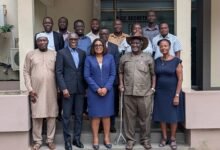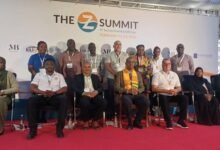Accra Aca ‘74 year group holds public lecture

The Bleoo ‘74 year group of the Accra Academy as part of its 50th anniversary has organised the 7th Konuah, Halm-Addo, Awuletey and Alema Memorial lecture on the topic: Sickle Cell Disease; Transforming treatment and care in Ghana.
The event was also used to cut the anniversary cake and pay tributes to the founding fathers of whom the lecture which kick-started in 1991, derived its name.
Welcoming participants who were mostly old students from Bleoo group of 1974, Rev William Garr, the head master of Accra Academy, said the sacrifices the founding fathers made in their effort to establish the school warranted such a memorial lecture to perpetually immortalise their names.
He recalled that the founding fathers had ran the school without receiving salaries and even supported the running of the school from their own pockets until later it became a government assisted school.
Prof. Isaac Odame, a member of Bleoo ‘74 and a Professor of Paediatrics and the Alexandra Yeo Endowed Chair in Haematology at the University of Toronto, Canada who delivered the lecture emphasised the need for Ghana to do a universal new born screening for sickle cell disease.
He said such a need was imperative in view of the fact that early detection of the disease would lead to early treatment to ensure that lives which were hitherto lost unnecessarily could be saved.
Prof. Odame said the disease was no more a death sentence as many people perceived since medications were available to treat most of the opportunistic infections and pains associated with the ailment.
He said some of the drugs which have been found to fight the opportunistic infections and the pain were the daily dosage of penicillin and hydroxyurea in addition to blood transfusion and bone marrow transplant.
He said with modern medicinal practice catching up very fast on the disease, the future looked bright for people living with the disease.
Prof. Odame said in Ghana’s effort to reduce the disease burden, a pilot project of testing newborn babies was started in Komfo Anokye Teaching Hospital (KATH) in February 1995, adding that between that year to 2018 with a dedicated staff well trained to handle the screening of about 500,000 children from which 1.8 per cent tested positive saying, “what this means is that one in every 50 babies born within that time have the disease which made it a public health issue,”.
He said later in 2017 through his efforts coupled with the dedicated staff the pilot project was replicated at the Korle Bu Teaching Hospital with the result showing the same pattern of 1.7 percentage indicating that it was prevalent in communities.
He said in order to reduce the disease burden on the parents, babies detected to carry the disease were tracked to their homes and medication and clinical visits were the cornerstone of such visits.
Prof. Odame said it was heart-warming that Ghana has decided to partner with pharmaceutical giants Norvatis to fight sickle cell disease in the country in a public-private partnership adding that such a partnership could help control the universal coverage to make Ghana an exceptional case in Sub-Saharan Africa.
He advised Ghanaians to do away with the stigma associated with the disease which made people living with it suffer in silence, especially, when people call them sicklers since that denotes hopelessness in being afflicted with the disease.
Prof. Odame called for public education and awareness through engaging with the community leaders and traditional leaders to explain the nature of the disease so that there might be understanding of how it could be treated and managed.
BY LAWRENCE MARKWEI






